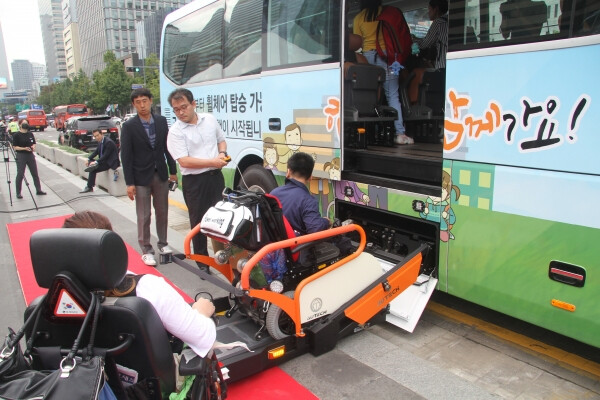
[GLOBAL ECONOMIC TIMES] Wheelchair seats have been installed on intercity and express buses since 2019, but as all routes were abolished after five years of wheelchair seat operation, it was found that the mobility rights of the disabled are being neglected once again.
According to the office of Rep. Hwang Un-ha of the Fatherland Innovation Party on the 24th, the Ministry of Land, Infrastructure and Transport has been promoting a project to support the operation of intercity and charter buses equipped with wheelchair riding and fixing facilities to support mobility of the disabled since 2019. This project supports vehicle modification costs (up to 40 million won per vehicle) or vehicle purchase costs when introducing a new vehicle equipped with a wheelchair (up to 30 million won per vehicle).
However, even though the Ministry of Land, Infrastructure and Transport conducts an annual public offering, there were no applicants, so the entire budget from 2020 to 2023 was found to be unused. This year, there were not a single application, so it appears that the budget will not be implemented.
Bus operators are not participating in the project due to low number of users and low profitability. However, in the case of wheelchair seats, the office of Representative Hwang Un-ha explains that the route itself is operated inefficiently, so the utilization rate is bound to be low.
For three years from 2019 to 2021, express bus wheelchair seats were operated on four routes: △Seoul~Busan △Seoul~Gangneung △Seoul~Jeonju △Seoul~Dangjin. Among these, the Seoul to Busan, Gangneung, and Jeonju routes are operated by KTX, so there is no reason to use express buses, which take longer travel time. In fact, from 2021, there was demand only for the Seoul-Dangjin route, where KTX does not operate.
Current status of wheelchair-accessible intercity and charter bus support projects and statistics on wheelchair seat use ⓒOffice of Representative Hwang Un-ha
Additionally, if wheelchair seats are installed on buses, about 5 seats on regular buses will no longer be usable, which will inevitably result in losses. In other words, there is no incentive for business operators to operate wheelchair seats, which have little demand and incur losses.
In response, Rep. Hwang Un-ha said, “The current policy only supports vehicle modification and purchase costs, so it is difficult to encourage business participation,” and added, “There is a need to consider a plan for the government to subsidize even a portion of the losses resulting from the operation of wheelchair seats.” .
He added, “Bus operators should also view the operation of wheelchair seats as a social contribution rather than for profit,” and added, “The state and companies should work together to expand mobility rights for the disabled.”
[Copyright (c) Global Economic Times. All Rights Reserved.]






























